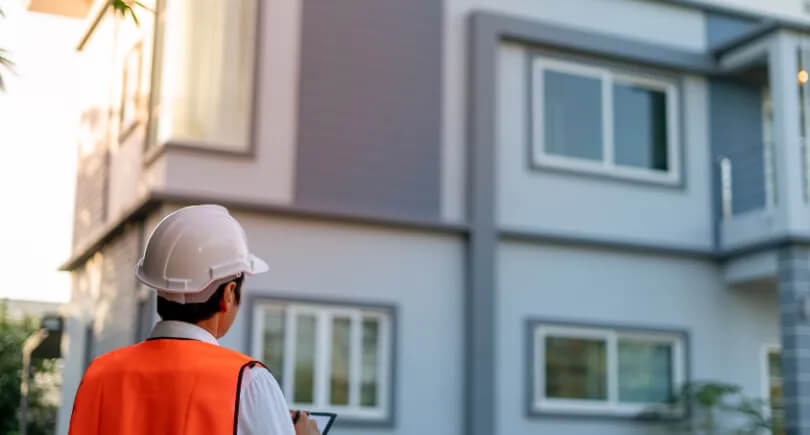Navigating the complexities of today’s competitive housing market can be exhilarating, especially when you’ve found a home that seems perfect for you. However, in the excitement, you might be tempted to waive the home inspection to make your offer more appealing to sellers. Before you make that decision, it’s important to understand the crucial role a home inspection contingency plays in protecting your interests. Today, we will learn about important aspects of home inspection and why it is necessary.
Home Inspection Contingency
Before going further into this, let’s understand what a home inspection contingency is. We can define it as a clause in a real estate contract that allows for a complete inspection of a home or property before binding the real estate contract within a limited time frame. It helps to get a complete survey and provide better information about the property so the buyer can reconsider the deal and sale prices or ask for necessary repairs.
Home Inspection Contingency clause ensures that the buyer is fully aware of the property’s condition and can make an informed decision. A qualified inspector examines key areas such as the structure, roof, plumbing, electrical systems, and more during the inspection. The resulting report outlines any necessary repairs or potential problems. If the issues are substantial, the buyer can renegotiate terms with the seller or back out of the deal altogether. This contingency provides vital protection, helping buyers avoid unforeseen expenses. Hence, ensuring that the property meets their expectations before they commit to the purchase.
Inspection Period For Home Buyers
The inspection period for home buyers typically lasts between 7 to 10 days, although this can vary depending on the terms agreed upon in the real estate contract. Some contracts may allow a shorter period, while others might extend up to 14 days or more. Buyers must schedule and complete the inspection within this timeframe to have enough time to review the results and make any necessary negotiations or decisions before the deadline.
Areas Covered in Home Inspection

A home inspection typically involves examining the structural components, exterior features, interior elements, plumbing systems, electrical systems, heating, ventilation, air conditioning (HVAC) systems, and major appliances. The inspection aims to identify any existing or potential issues that could affect the property’s safety, functionality, and value. During this period, the inspection team inspects the major systems and structures, which include:
Inspection Outside the House
-
- Walls: Inspect for damaged or missing siding, cracks, and settling, and check soil for leaks or pests.
- Foundation: Look for soil dips, poor grading, and secondary signs of foundation issues like cracks.
- Roof: Check for loose/missing shingles, damaged vents/pipes, and potential water intrusion points.
- Garage: Test door operation, check for sealing, proper ventilation and look for pest/water prevention.
- Grading: Ensure ground slopes away from the home to prevent water pooling and recommend regrading if necessary.
Inspection Inside the House
-
- Electrical Examination: Identify wiring type, test outlets, ensure GFCIs in key areas, and check electrical panel.
- HVAC System Check: Evaluate the furnace and AC, note the type, size, and age, check the operation and maintenance records, and inspect the ductwork.
- Plumbing Inspection: Identify pipe types, test water pressure, check for leaks under sinks and in cabinets, and locate water shut-off valves.
- Fire Safety Review: Ensure smoke and carbon monoxide detectors work. Check the attached garage wall integrity.
- Bathroom Inspection: Look for leaks, secure toilets, and ensure proper ventilation to prevent mould and mildew.
- Laundry Room Ventilation Check: Verify that the dryer exhaust system is correctly vented and unobstructed.
- Water Heater Assessment: Determine age and condition, estimate replacement time, and ensure functionality.
- Appliance Verification: Ensure major appliances like the dishwasher and stove are operational. Skip small appliances.
Importance of Home Inspection Contingency

Home inspection contingencies play a vital role in safeguarding buyers during the home purchasing process. By ensuring a thorough inspection before finalising the deal, buyers can uncover potential issues and make well-informed decisions. Let’s delve into why these contingencies are so important for buyers:
-
- Identifying Hidden Issues: Inspections can reveal problems not visible during a casual walkthrough, such as structural damage, plumbing issues, or electrical faults. This helps buyers understand the true condition of the property.
- Negotiation Leverage: If significant issues are found, buyers can negotiate with the seller for repairs, a price reduction, or a credit towards closing costs, potentially saving money.
- Informed Decision-Making: With a detailed inspection report, buyers can decide whether to proceed with the purchase, request modifications to the contract, or walk away without penalty.
- Financial Protection: Avoiding unexpected repair costs after purchase protects the buyer’s financial interests and ensures they are not burdened with unforeseen expenses.
- Peace of Mind: Knowing the exact condition of the home gives buyers confidence in their investment, reducing the risk of future surprises and ensuring the property meets their expectations and needs.
Potential Drawbacks of Home Inspection Contingencies

Home inspection contingencies are essential, but they come with their own set of challenges. Understanding these can help buyers navigate the process more effectively. Here are some common challenges associated with inspection contingencies:
-
- Time Constraints: The inspection period is often limited to 7-10 days, which can be stressful for buyers. Scheduling the inspection, reviewing the report, and making decisions all within this timeframe can be challenging.
- Deal Jeopardy: Sellers might perceive an inspection contingency as a potential risk to the deal. If significant issues are discovered, it can lead to renegotiations or even cancellation, which sellers may not be keen on.
- Cost of Inspections: Professional home inspections can be costly, adding to the initial expenses of buying a home. However, this cost is often outweighed by the potential savings from uncovering major issues.
- Disagreements Over Repairs: Even if issues are identified, buyers and sellers might disagree on addressing them. Negotiating repairs or price reductions can sometimes lead to conflict and delays.
- Market Competitiveness: In a hot market, some buyers might feel pressured to waive the inspection contingency to make their offer more attractive. This can be risky and leave buyers vulnerable to unexpected issues.
Considering Waiving the Home Inspection Contingency?
Waiving an inspection contingency can be a bold move in a competitive housing market, but it comes with significant risks. Imagine agreeing to buy a home only to discover unexpected and costly repairs later. Sounds daunting, right? However, there are situations where this might be more acceptable, such as with newly built homes that come with builder warranties or if you plan extensive renovations anyway.
In hot markets, waiving the inspection can make your offer stand out to sellers. But hold on—before you take this leap, ensure you’re confident about the property’s condition. Have you reviewed a previous inspection report or a seller-provided one? Consulting your real estate agent and getting a quick assessment from a trusted contractor can help spot major red flags. Remember, you’ll need the financial means to cover any unforeseen repairs since you won’t have the chance to negotiate for fixes or price reductions. While waiving the inspection contingency can sometimes be necessary, it requires careful thought and a clear understanding of the risks involved. Make sure you’re prepared before making this crucial decision.
Wrapping It Up
A home inspection contingency is vital for protecting your investment in real estate. It allows for thoroughly examining the property, identifying hidden issues and providing negotiation leverage. The inspection period, typically 7 to 10 days, ensures buyers can make informed decisions, negotiate repairs, or adjust the price. Despite the cost and potential deal delays, the benefits outweigh the risks by preventing unforeseen expenses and ensuring the property meets expectations. Waiving this contingency in competitive markets should be done cautiously, as it carries significant risks. Ultimately, it safeguards your financial interests and offers peace of mind.
You May Also Read
|
Guide To Commercial Building Inspection |
|
|
What is Home Equity Line of Credit |
|
|
Know The Tiny Home Builders |
|
|
Explore The Popular Houses in Canada |
|
|
Meaning of Home Staging in Canada |
Frequently Asked Questions (FAQs)
What is the wording of a home inspection clause?
A typical home inspection clause in a real estate contract might state that the offer is conditional upon the Buyer obtaining and being satisfied with a home inspection report from a qualified inspector within a specified number of days after acceptance of the Agreement. The Seller must provide reasonable access for this inspection. Suppose the Buyer is unsatisfied with the inspection results. In that case, they may terminate the Agreement by giving written notice before the inspection period ends, and any deposit will be returned in full.
What is the inspection condition clause in Ontario?
In Ontario, an inspection condition clause often specifies that the Agreement is conditional upon the Buyer obtaining a professional home inspection within a specified number of days after acceptance. If the inspection is unsatisfactory, the Buyer can nullify the Agreement, and the deposit will be returned. The Seller must provide access for the inspection at mutually agreeable times.
How often can my landlord inspect Ontario?
In Ontario, landlords must give at least 24 hours' written notice before entering a rental unit, specifying the reason and time for entry, which must be between 8am and 8pm There are no strict limits on inspection frequency, but they must be reasonable and not interfere with the tenant’s right to quiet enjoyment. Frequent or unreasonable inspections may be considered harassment.



































